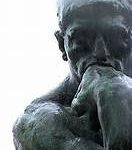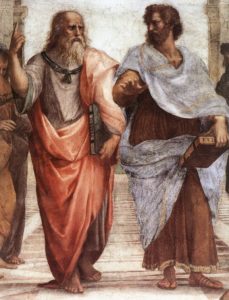“But I thought you were an intelligent man!”
I am Mark Sadler, Professor of Philosophy for my local community college. I have been teaching philosophy for twenty years. I am not your typical life-long academic, however. Before teaching in the academe I worked in the engineering world and served in the U.S. Air Force. Mark Eckel asked that I relate one of my classroom experiences. I am pleased to do so.
 As class ended one day, I was making small talk with students as they left my lecture hall. One student stopped to ask me a personal question. My students know my life is an open book; they are permitted to ask any question they like.
As class ended one day, I was making small talk with students as they left my lecture hall. One student stopped to ask me a personal question. My students know my life is an open book; they are permitted to ask any question they like.
“Do you believe in God?” she wanted to know.
“Yes, I do,” was my straightforward response. She smiled, turning to leave.
Another student, who had been standing behind me, spoke up.
 “What?! Dr. Sadler I thought you were an intelligent man.” His disappointment was apparent. I was taken back for a moment. The implications of his statement were provocative.
“What?! Dr. Sadler I thought you were an intelligent man.” His disappointment was apparent. I was taken back for a moment. The implications of his statement were provocative.
“Why did you believe I was a smart man in the first place?” was my reply.
“Because of the things we have talked about in class,” was his honest answer. “You helped me understand science and the need for being a better person.”
 “So, we have solved some complicated problems in class, right?” I was now back in my comfort zone dialoging about important matters.
“So, we have solved some complicated problems in class, right?” I was now back in my comfort zone dialoging about important matters.
“Yes,” he confessed. “But how can a smart person believe in an invisible God?” came his abrupt but candid question.
“If you perceived me to be intelligent when we discussed science or ethics,” I zeroed in on his assumption, “Why would you be so quick to think I am now unintelligent because I believe in God?”
He pondered my question but I saw the seeds of understanding begin to sprout.
 “Perhaps, another way we can look at this is to ask the question in a different way,” my philosopher’s mind began to frame the logic.
“Perhaps, another way we can look at this is to ask the question in a different way,” my philosopher’s mind began to frame the logic.
“If you respect me as an intelligent person,” I began, “And my intellect directs me to believe in God, could it be that we should consider the possibility of God’s existence?”
“I assumed that intelligent people were atheists,” he readily admitted.
 “Many of the people we have discussed at length in class also believed in some sort of God,” I said, hoping to correct his misconception. I reviewed some of our discussions. His eyes began to brighten.
“Many of the people we have discussed at length in class also believed in some sort of God,” I said, hoping to correct his misconception. I reviewed some of our discussions. His eyes began to brighten.
My questioning continued, “Of all the issues we have discussed in class, is there anything that you believe points to God’s absence?”
He admitted there was not.
“So, how does my belief in God diminish your opinion about my intelligence?” was my final query.
I wish I could say that this young man converted to my Faith. He did not.
 But, this young man still writes and stops by to chat. He is agnostic, doubtful about God’s existence; perhaps, he has good reasons.
But, this young man still writes and stops by to chat. He is agnostic, doubtful about God’s existence; perhaps, he has good reasons.
The good news is that he no longer confesses that a theist is not, by definition, unintelligent.
I am thankful for my place in the universe and the university. I am grateful for my relationship with the Creator and Sustainer of the Universe.
And, I am thankful that God allows me to be considered his emissary in philosophy.
 Mark is grateful to know Dr. Sadler through social media. Dr. Mark Eckel edited Dr. Sadler’s story and is president of The Comenius Institute.
Mark is grateful to know Dr. Sadler through social media. Dr. Mark Eckel edited Dr. Sadler’s story and is president of The Comenius Institute.



Thank you for this post, Dr. Sadler. As a lover of philosophy, and a theist, I very much enjoyed it.
I think your conversation with the student was spot on. It is important for us to shine light on the assumptions people have. This assumption, of theists being unintelligent, is one that I have encountered many times. It’s prevalent, in part I think, because of the rhetoric of popular atheists such as Hitchens, Dawkins, and so on and so forth.
One of the first things I do when I encounter this is to mention several people in history, all of whom are regarded as very intelligent, who believed in God.
A common refrain is that those people had no choice but to believe in God. After all, everyone did. But this is, first of all, a common mistake, and it seems to claim that atheism basically did not exist until the Enlightenment. Such a thing is simply not true. And second, it also assumes that such intelligent people, had they lived in today’s times, would not have believed in God. But there is no reason to think that they wouldn’t, other than this assumption about theists being unintelligent. But such an assumption is unwarranted, especially since there are brilliant thinkers even in the modern age who believe and have believed in God. I’m certain you are quite familiar with them.
Well, I think that’s all of the rambling I’ll do. Thanks again for the post! 🙂